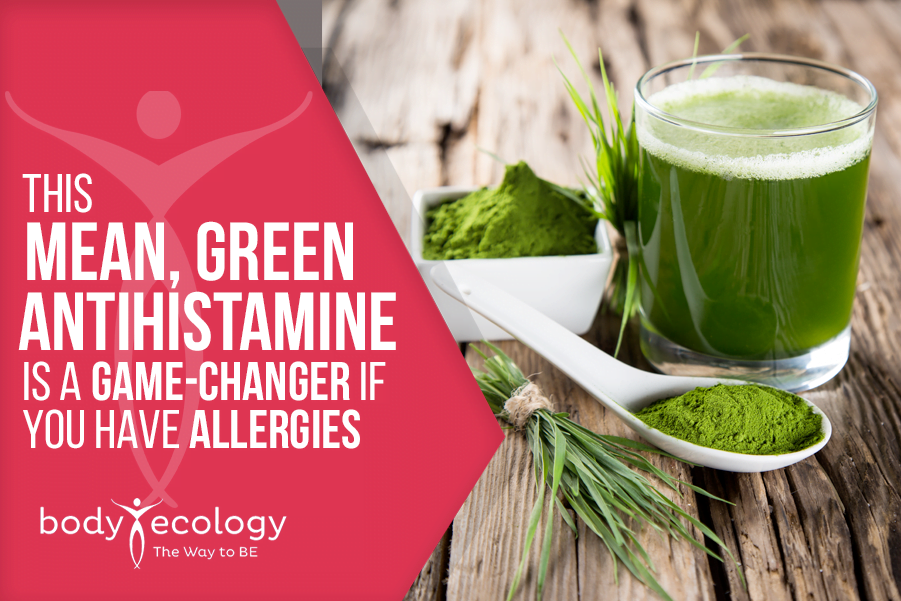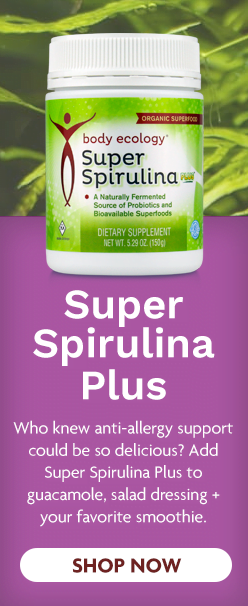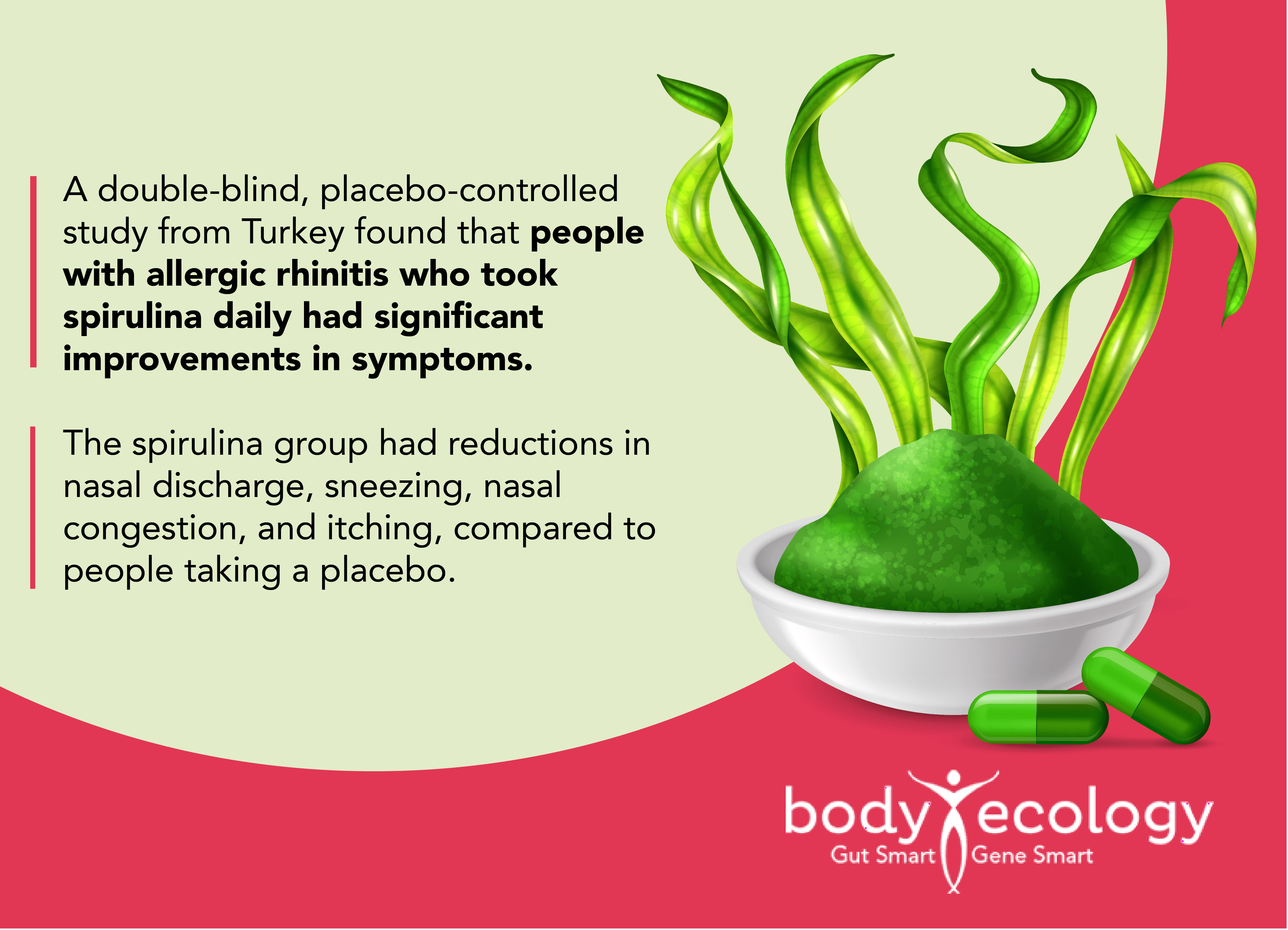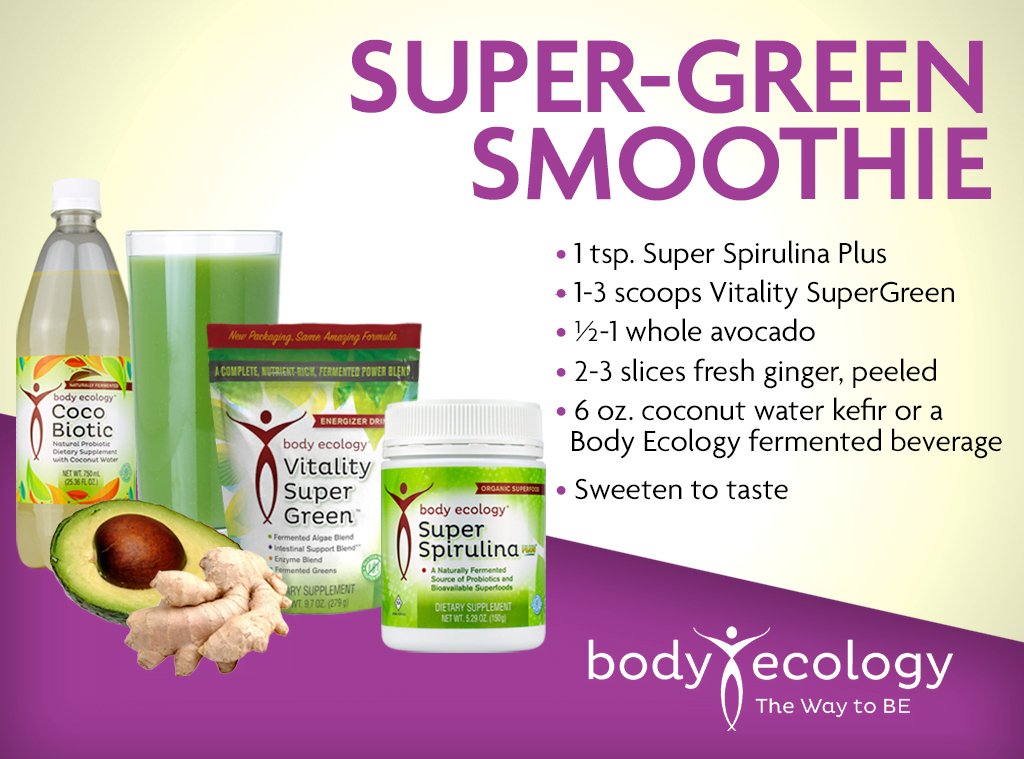
Say goodbye to allergy meds and say hello to nature’s antihistamine
Spirulina is the blue-green algae made famous by NASA after the agency used it to support astronauts’ health during space missions. Back on earth, spirulina is a popular supplement now recognized for supporting all-around health, especially the immune system. In part, that’s because spirulina is an antihistamine — and a powerful weapon to have in your arsenal against allergies.

Getting to know spirulina, the protein-packed microalgae
Also known as Arthrospira, spirulina is a microscopic cyanobacterium that gets its energy from the sun through photosynthesis:
- It lives in fresh and marine waters and is called spirulina because it has a spiral or helical shape.
- Because it doesn’t have a cellulose cell wall, spirulina is really easy to digest, meaning it readily offers up its nutrients.
- This amazing algae can contain up to 70-percent protein and is also rich in vitamin B6, beta-carotene, iron, and other minerals, as well as tocopherols, gamma-linolenic acid, and phenolic acids.
In the U.S., spirulina has Generally Recognized as Safe (GRAS) status through the U.S. Food and Drug Administration. It’s fairly easy to cultivate and harvest and grows in Greece, Japan, India, Spain, and the U.S. where it needs sunny areas and very alkaline lakes with a high pH.
Spirulina was once used by the Aztecs and continues to be an important source of protein and micronutrients for many humans worldwide. It has even been recommended by the World Health Organization (WHO) as a beneficial food to tackle childhood malnutrition.
Aside from being highly nutritive, spirulina benefits for health are well-established through scientific research.
“I will not be without this. It helps me digest and energizes me. This is my ‘coffee.’” Try our Super Spirulina Plus.
But surprise… spirulina supports immunity and relieves allergies?
Spirulina inhibits the release of histamine by mast cells, exerting an anti-inflammatory effect that can help keep allergy symptoms in check:1,2
- One randomized, double-blind, placebo-controlled trial (the gold standard for clinical research) found that people with allergic rhinitis who took spirulina daily for 12 weeks had significant reductions in interleukin-4 levels (a 32-percent drop with high-dose spirulina), compared to people taking a placebo.3 IL-4 is an important cytokine involved in regulating immunoglobulin-E-mediated allergy.
- Other studies have found that spirulina can have beneficial modulatory effects on natural killer (NK) cell activity, immunoglobulin-A (IgA) antibody response, and other components of the immune system, all of which can affect how the body handles allergies.4-6

The main component of spirulina that seems active against allergies is something called phycocyanin.
Just like curcumin is a key active compound responsible for turmeric’s anti-inflammatory effects, the pigment phycocyanin is thought to be essential to tamping down disproportionate immune system reactions to allergens. Phycocyanin also appears to selectively inhibit cyclooxygenase-2 (COX-2), levels of which are associated with inflammation and cancer.7
In one study, rats who were allergic or sensitive to eggs were given phycocyanin an hour before exposure to egg white protein. Instead of the typical dramatic increase in inflammatory molecules and histamine, the rats given the extract from spirulina had a significantly reduced reaction to the protein, suggesting that spirulina has an inhibitory effect on mast cell-mediated immediate allergic reactions.8
Aside from being a natural antihistamine: What else is spirulina good for?
Other spirulina benefits include: It’s packed with easily absorbed nutrients that help give the body an energy boost. This has made the supplement very popular with folks living with chronic fatigue — as well as anyone experiencing tiredness related to anemia or low levels of B vitamins, such as vitamin B6.
Spirulina is itself rich in iron and some B vitamins, but it helps support nutrition in another way too: by promoting a diverse, healthy microbiome. This includes sustaining the health of vitamin B6-producing Lactobacillus, suggesting that a combination of spirulina and probiotics could be especially beneficial.9
And:
- Spirulina may have direct effects on certain viruses, including inhibiting the replication of several viruses in lab tests.
- These include Herpes simplex type I, human cytomegalovirus, measles and mumps virus, influenza A virus, and human immunodeficiency virus-1 virus (HIV-1).10,11
Spirulina benefits may extend to supporting the body’s clearance of toxic heavy metals.
In one placebo-controlled, double-blind study, 250 mg of spirulina extract plus 2 mg of zinc taken twice daily was used to address chronic arsenic poisoning, alongside using filtered water.12 This small study involving 41 people applied the treatment for 16 weeks, and results demonstrated that the combination of supplements showed great promise for treating poisoning with this heavy metal.
Specifically, after just four weeks, the group using the supplements, in addition to filtered water, had a sharp increase in urinary excretion of arsenic. The authors noted that spirulina plus zinc “removed 47.1-percent arsenic from scalp hair” and had no major adverse effects.
Folks with high cholesterol or troubles maintaining healthy lipid levels may also want to take a look at spirulina. A handful of studies have found that the supplement was associated with beneficial changes to cholesterol levels, the ratio of good and bad cholesterol, and triglycerides.
One study confirmed a significant reduction of high-density lipoprotein (LDL) cholesterol when participants took 4.2 g of spirulina per day for eight weeks, while another study noted significant reductions in triglyceride levels and increases in levels of beneficial HDL cholesterol.13,14
A small study looking at people with diabetes found that spirulina helped reduce the ratio of LDL to HDL, confirming spirulina benefits for cardiovascular health.15 And another study in a rat model of diabetes suggested that spirulina’s antioxidant properties may be especially helpful for protecting the pancreatic beta cells that produce insulin.16
Finally, spirulina is probably best known for its antioxidant properties.
The blue-green algae contains several natural antioxidants with free-radical-scavenging activity.17 This is why spirulina is sometimes included as part of natural protocols to help address certain types of cancer. Studies are, for obvious reasons, quite scarce, but those that do exist show promising results.18-21
Spirulina benefits: How to use it for health maintenance + allergy support
Spirulina can be, for some, an acquired taste. This means it’s best not to start out by sprinkling the powder liberally on oatmeal or similar foods.
Instead, a good way to incorporate it into your daily routine (and harness those spirulina benefits) is to add it to smoothies, increasing the amount over the course of a few days as you get familiar with the flavor. Donna adds our Super Spirulina Plus to our Probiotic Protein Shake and loves the taste but, even more so, the medicinal benefits.
If you’re into baking, spirulina is a great natural food colorant. You can add spirulina powder to raw food treats, like bliss balls and dehydrated coconut cookies, to give them a fun blue-green color and extra nutritional oomph. Spirulina can also add a nice seaweed-like taste to salad dressings, and some people even enjoy using it to make a latte (think spirulina + oat milk latte) for a daily antioxidant and anti-allergy boost.
Fermented spirulina is a great addition to any diet! When fermented, the nutritional spirulina benefits are significantly enhanced. Fermentation offers an abundance of beneficial nutrients that are easily absorbed and used by your body.
In the studies cited here, participants took the spirulina anywhere from four weeks to three months. Super Spirulina Plus is a food — so it’s beneficial to take it every day. You’ll see more benefits if you use it consistently for at least a month. In Australia, Super Spirulina Plus has become a popular food for pregnancy and breastfeeding mums too.
And with allergy season upon us, the COVID virus still around, and stress levels already threatening to overflow that histamine bucket, a daily dose of spirulina may be just what the doctor ordered.
REFERENCES:
- 1. Yang H-N, Lee E-H, Kim H-M. Spirulina platensis inhibits anaphylactic reaction. Life Sciences. 1997;61(13):1237–1244.
- 2. Kim H-M, Lee E-H, Cho H-H, Moon Y-H. Inhibitory effect of mast cell-mediated immediate-type allergic reactions in rats by Spirulina . Biochemical Pharmacology. 1998;55(7):1071–1076.
- 3. Mao TK, van de Water J, Gershwin ME. Effects of a Spirulina-based dietary supplement on cytokine production from allergic rhinitis patients. Journal of Medicinal Food. 2005;8(1):27–30.
- 4. Ishii K, Katoch T, Okuwaki Y, Hayashi O. Influence of dietary Spirulina platensis on IgA level in human saliva. Journal of Kagawa Nutrition University. 1999;30:27–33.
- 5. Hirahashi T, Matsumoto M, Hazeki K, Saeki Y, Ui M, Seya T. Activation of the human innate immune system by Spirulina: augmentation of interferon production and NK cytotoxicity by oral administration of hot water extract of Spirulina platensis. Int Immunopharmacol. 2002 Mar;2(4):423-34.
- 6. Cingi C, Conk-Dalay M, Cakli H, Bal C. The effects of spirulina on allergic rhinitis. Eur Arch Otorhinolaryngol. 2008 Oct;265(10):1219-23. doi: 10.1007/s00405-008-0642-8. Epub 2008 Mar 15. PMID: 18343939.
- 7. Reddy MC, Subhashini J, Mahipal SV, Bhat VB, Srinivas Reddy P, Kiranmai G, Madyastha KM, Reddanna P. C-Phycocyanin, a selective cyclooxygenase-2 inhibitor, induces apoptosis in lipopolysaccharide-stimulated RAW 264.7 macrophages. Biochem Biophys Res Commun. 2003 May 2;304(2):385-92. doi: 10.1016/s0006-291x(03)00586-2. PMID: 12711327.
- 8. Kim HM, Lee EH, Cho HH, Moon YH. Inhibitory effect of mast cell-mediated immediate-type allergic reactions in rats by spirulina. Biochem Pharmacol. 1998 Apr 1;55(7):1071-6.
- 9. Finamore A, Palmery M, Bensehaila S, Peluso I. Antioxidant, Immunomodulating, and Microbial-Modulating Activities of the Sustainable and Ecofriendly Spirulina. Oxid Med Cell Longev. 2017;2017:3247528. doi: 10.1155/2017/3247528. Epub 2017 Jan 15. PMID: 28182098; PMCID: PMC5274660.
- 10. Hayashi K, Hayashi T, Maedaa M, Kojima I. Calcium spirulan, an inhibitor of envelope virus replication, from a blue-green alga Spirulina platensis . Journal of Natural Products. 1996;59:83–7.
- 11. Ayehunie S, Belay A, Baba TW, Ruprecht RM. Inhibition of HIV-1 replication by an aqueous extract of Spirulina platensis (Arthrospira platensis) . Journal of Acquired Immune Deficiency Syndromes and Human Retrovirology. 1998;18(1):7–12.
- 12. Misbahuddin M, Islam AZ, Khandker S, Al-Mahmud I, Islam N, Anjumanara Efficacy of spirulina extract plus zinc in patients of chronic arsenic poisoning: a randomized placebo-controlled study. Clinical Toxicology. 2006;44(2):135–141.
- 13. Nakaya N, Homa Y, Goto Y. Cholesterol lowering effect of Spirulina . Atherosclerosis. 1988;37:1329–1337.
- 14. Ramamoorthy A, Premakumari S. Effect of supplementation of Spirulina on hypercholesterolemic patients. Journal of Food Science and Technology. 1996;33(2):124–128.
- 15. Mani UV, Desai S, Iyer U. Studies on the long-term effect of Spirulina supplementation on serum lipid profile and glycated proteins in NIDDM patients. Journal of Nutraceuticals, Functional and Medical Foods. 2000;2(3):25–32.
- 16. Lee J, Park A, Kim MJ, Lim HJ, Rha YA, Kang HG. Spirulina Extract Enhanced a Protective Effect in Type 1 Diabetes by Anti-Apoptosis and Anti-ROS Production. Nutrients. 2017 Dec 15;9(12):1363. doi: 10.3390/nu9121363. PMID: 29244751; PMCID: PMC5748813.
- 17. Reddy MC, Subhashini J, Mahipal SVK, et al. C-Phycocyanin, a selective cyclooxygenase-2 inhibitor, induces apoptosis in lipopolysaccharide-stimulated RAW 264.7 macrophages. Biochemical and Biophysical Research Communications. 2003;304(2):385–392.
- 18. Shklar G, Schwartz J. Tumor necrosis factor in experimental cancer regression with alphatocopherol, beta-carotene, canthaxanthin and algae extract. European Journal of Cancer and Clinical Oncology. 1988;24(5):839–850.
- 19. Mathew B, Sankaranarayanan R, Nair PP, et al. Evaluation of chemoprevention of oral cancer with Spirulina fusiformis. Nutrition and Cancer. 1995;24(2):197–202.
- 20. Schwartz J, Shklar G, Reid S, Trickler D. Prevention of experimental oral cancer by extracts of Spirulina-Dunaliella algae. Nutrition and Cancer. 1988;11(2):127–134.
- 21. Schwartz J, Shklar G. Regression of experimental hamster cancer by beta carotene and algae extracts. Journal of Oral and Maxillofacial Surgery. 1987;45(6):510–515.









